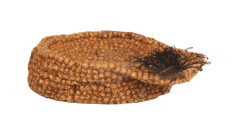Presented by Museum of the Peace Corps Experience and American University Museum
c. 1969
Arabsiyo, Northern region, Somalia (also known as Somaliland)
Sewn burrs, black feather, 2 x 6 1/2 x 8 1/2 in.
Collection, Museum of the Peace Corps Experience
Gift of Jeanne D’Haem, Somalia, Arabsiyo and Hargeisa 1968–70

On a truck from Hargeisa to my teaching post, I sat on a crate. “Your mother must have offended a jinn,” a woman said. “Only a jinn would make a person white like the devil!”
Later I felt hot air on my ankle and peered into the crate. It was a lion, suffering and nearly unconscious. The Somali would not sit near the lion, nor would they offer it food or water.
Several men on horses appeared. They stopped the truck and shouted something I didn’t understand. After everyone got off the truck, I pried the crate open, wet a corner of my scarf with water, and lowered it to the suffering animal. Angry at the abuse of this poor lion, I shouted, “Wham-a hii?” (“What’s going on?”)
One horseman rode over to me. “Muga-Ah?” (“What’s your name?”), he asked.
“Jeanne,” I replied. Revived, the lion began to sit up. “Muga-Ah?” I asked him, enjoying his surprise when he saw the lion.
“Shifta, Wa Shifta,” he replied. He handed me his hat of brown burrs, signaled his men, and they quickly rode off.
When I got home to my village, headmaster Abdillahi visited with two teachers, Subti and Abdul Kader.
“Everyone is talking about you, Jeanne,” Abdillahi said, shaking his finger in my face. “Do you Americans know about the Shifta? They are bandits. These Shifta were planning to rob the truck. Didn’t you see the guns?” Then he laughed. “This Shifta had never seen a White woman so closely before. He saw that you were not afraid, and you were sitting on a lion. He thought you might be a jinn and ran away!”
“That’s not what happened,” interrupted Subti. “The Qur’an tells about Mohammed and a prostitute at a well. She saw a thirsty dog and dipped her shoe into the water for the dog. Mohammed said her sins would be forgiven because of her kindness. The Shifta thought you brought a message from God.”
“No,” said Abdul Kader. “The Shifta saw this White woman. The passengers said, “That’s Jeanne.” He thought they said jinn. He gave you his hat so you wouldn’t put a spell on him.”
This hat reminds me that we see through the lens of our own culture. Even under the bright African sun, we walk in darkness.
The Committee for a Museum of the Peace Corps Experience is a 501(c)(3) private nonprofit organization. Tax ID: EIN # 93-1289853
The Museum is not affiliated with the U.S. Peace Corps and not acting on behalf of the U.S. Peace Corps.
Museum of the Peace Corps Experience © 2024. All Rights Reserved.